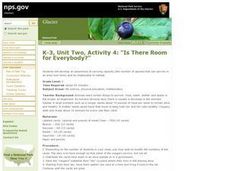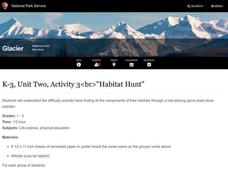Curated OER
Knowing the Essential Elements of a Habitat
First graders compare their environment with that of Belize by researching via the internet on the sites provided. Students participate in various activities/centers utilizing the information they discovered.
EngageNY
Continued Close Reading of Bullfrog at Magnolia Circle: Text-Dependent Questions and Vivid Words and Phrases
In the third activity from this unit based on the book Bullfrog at Magnolia Circle, learners focus on using specific details from the text-to-answer questions about the habitat of bullfrogs. While reading the text, young...
Curated OER
Habitat is Home
Students complete a picture to show things found in their homes. For this habitat lesson, students discuss and make a class picture of an animal habitat and its four basic needs. Students sing a song. Students create their...
Curated OER
Fossil Fuels (Part I), The Geology of Oil
Junior geologists work through three mini-lessons that familiarize them with the formation and location of fossil fuels. Part one involves reading about petroleum and where it comes from via a thorough set of handouts. A lab activity...
Curated OER
Is There Room for Everybody?
Third graders examine the capacity of animals able to live in one habitat. In this habitat lesson plan, 3rd graders play a game that shows the food chain and the interactions between animals in an area. Students discover that food is a...
ARKive
Nocturnal Animals
How do those nocturnal animals see in the dark? This perplexing question does have an answer. First, little ones use their sense of touch to determine the name of a mystery object, then they listen closely to identify various animals by...
Curated OER
Habitat Hunt
Learners discover how hard it is for animals to find all the items needed in their habitat. In this habitat lesson, students play a game in which they pretend to be an animal, they discover that not all animals can find the food needed...
Michigan Sea Grant
Fish Habitat and Humans
Strict habitat requirements are needed for the survival of fish populations and fish variety in the Great Lakes. Young scientists become experts in the basic needs of fish and understand how survival necessities can vary with different...
Curated OER
A Close Encounter of the Tree Kind
Students study trees in their natural habitat. In this tree lesson plan, students complete a number of outdoor activities to estimate the height of a tree, examine how bark can be a distinguishing tree characteristic, and how to make a...
Curated OER
Marine & Aquatic Habitats Activities - Creatures in the Coral
Students describe unique adaptations of organisms that live in the coral reef habitat, read various books pertaining to coral reefs and ocean life, and construct a wheel demonstrating the relationships between certain coral reef...
American Museum of Natural History
Life in the City
Believe it or not, biodiversity exists even in areas of disturbed habitat. An interactive activity challenges learners to look for species with a magnifying lens in an image of a city habitat. Pop-up images and descriptions explain how...
Consortium for Ocean Science Exploration and Engagement (COSEE)
Life Cycle of Blue King Crabs
The blue king crab and the red king crab live in the same range but never in the same region. The third lesson in the series of five focuses on the blue king crab and the impact the changes in water temperature is having on its...
National Park Service
The Young Naturalist
Beginning with a brief history of our 26th president, Theodore Roosevelt, then followed by a discussion of his interest in nature, young scientists take to the outdoors to locate and observe local plants and insects....
Curated OER
Meadow Madness
Students explore the evolution from a pond habitat to a meadow. In this habitat lesson, students become familiar with a beaver meadow habitat. Students are aasigned an animal to research and find why the animal best survives...
Curated OER
The Bear Facts
Students explore various kinds of bears and gather information about them. In this research and habitats lesson, students chart their bear information on large posters with illustrations of their bears. Students map the...
Curated OER
Goldilocks and the Real Bears
Students participate in a comparison instructional activity where they compare fictional bears to real life bears. In this science/language arts instructional activity, students read Goldilocks and the Three...
Curated OER
What's That Habitat?
Fourth graders explore the environment by researching animal characteristics. For this habitat identification lesson, 4th graders utilize paper and crayons to illustrate their own habitats or homes and discuss what it contains that is...
Curated OER
Habitat, What is That?
Students explore animal habitats. For this environmental stewardship lesson, students match animals to their habitats in a classroom activity. Students also observe a firefly habitat and read Fireflies. Students create bulletin boards...
Curated OER
Venus Flytrap
Students study the Venus Flytrap including its habitat and how it eats. In this ecology lesson students complete several experiments using a Venus Flytrap to see how it reacts to various conditions.
Curated OER
Spying on Spiders
Students investigate spiders. In this spiders lesson, students create a habitat for a spider with a jar, twigs, and dirt. Students observe the behavior of the spider and record how they spend their days.
Curated OER
Assessing the quality of habitat for Monarch Butterflies
Students use different sampling methods to determine the population size and appropriate space for monarch butterflies. In this averages lesson plan, students complete word problems where they can accurately estimate the size of an...
Curated OER
Simple Machines IV - Levers
The principles of levers and simple machines are presented here. An easy-to-make lever is constructed by each group of scientists, and they use it to explore how this simple machine makes heavy things so much easier to lift and move. A...
Curated OER
Tropical Rainforests
Learners create their own rainforest environment. This tropical rainforest lesson, introduces where rainforests are located, their real world connections, and their structural make up. It includes further resources online.
Consortium for Ocean Science Exploration and Engagement (COSEE)
Climate Change Impacts on Blue King Crabs
Carbon dioxide is not only causing global temperatures to increase, it causes the oceans to become more acidic. Lesson focuses on the blue king crab and the fragility of the habitat due to climate change. Scholars create a concept map...























